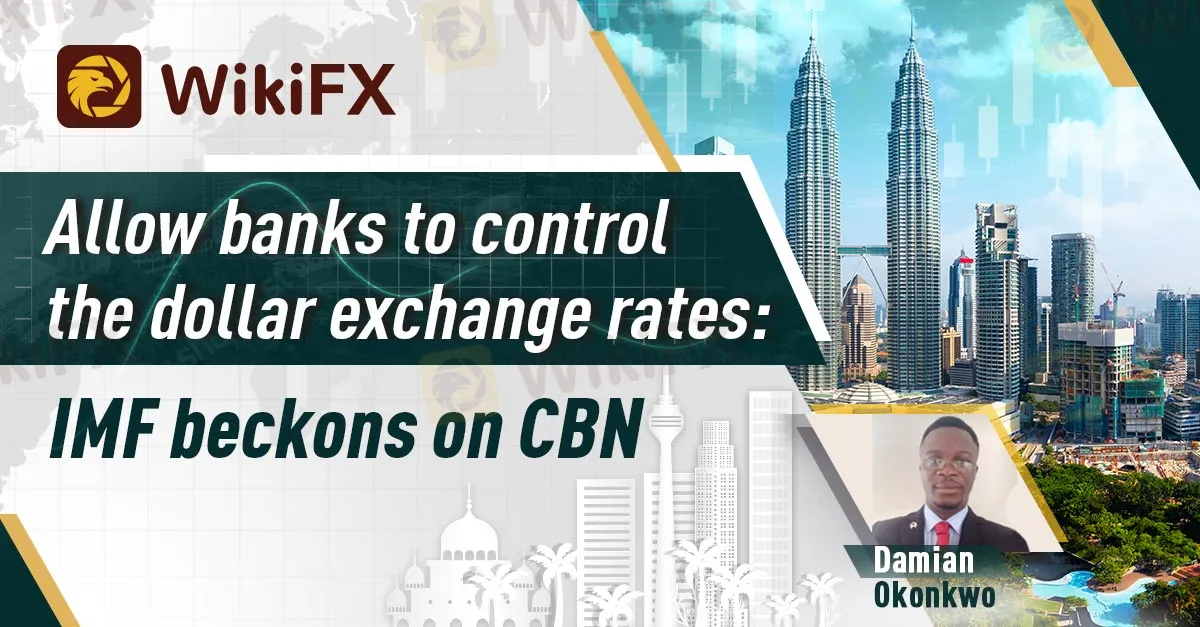简体中文
繁體中文
English
Pусский
日本語
ภาษาไทย
Tiếng Việt
Bahasa Indonesia
Español
हिन्दी
Filippiiniläinen
Français
Deutsch
Português
Türkçe
한국어
العربية
Allow banks to control the dollar exchange rates: IMF beckons on CBN
Abstract:The International Monetary Fund (IMF) has called on the Central Bank of Nigeria (CBN) to re-examine its foreign exchange (FX) management policy which allowed the apex banks to control the dollar exchange rates within the country. They considered this as limiting the market volatility by preventing the commercial banks to freely determine Fx buy-sell rates in the I&E windows.

By: Damian Okonkwo

The International Monetary Fund (IMF) has called on the Central Bank of Nigeria (CBN) to re-examine its foreign exchange (FX) management policy which allowed the apex banks to control the dollar exchange rates within the country. This had left the commercial banks sourcing to obtain dollars for their clients.
Addressing the present FX crisis in Nigeria in its 2022 Article IV Consultation presented during its official visit to the country, the IMF called on the CBN to allow the commercial banks to control the dollar exchange rates including the buy-sell prices as this will help reduce the dollar scarcity and improve the FX supply in the market. According to the IMF:
“In the medium term, the CBN should step back from its role as main forex intermediator, limiting interventions to smoothing market volatility and allowing banks to freely determine forex buy-sell rates.”
Thus, the IMF believed that allowing commercial banks to control the exchange rate will further increase the FX inflow into the country.
Speaking further on this, the IMF explained that the banks maintaining a uniform and market-clearing FX exchange rate is very necessary for boosting foreign investors' confidence in the economy.
Nonetheless, IMF stated that the continued present FX shortage, and practice of maintaining a stable exchange rate by the CBN amidst a weak Naira due to high inflation and limited debt servicing policies will all the more trigger fears of more future devaluation for the Naira amongst investors.
Describing this, the IMF stated that “These factors hinder much-needed capital inflows, encourage outflows, and constrain private sector investment.”
Above all, the body advised the Nigerian government to consider reducing its tax rate to fair levels at par with the standards of the Economic Community of West African States (ECOWAS).

Disclaimer:
The views in this article only represent the author's personal views, and do not constitute investment advice on this platform. This platform does not guarantee the accuracy, completeness and timeliness of the information in the article, and will not be liable for any loss caused by the use of or reliance on the information in the article.
Read more

Philippine Banks Launch PHPX Stablecoin for Cross-Border Payments
Philippine banks collaborate to launch PHPX, a peso-backed stablecoin, revolutionizing cross-border payments with real-time transfers and financial inclusion goals.

The Yuan’s Struggle: How China Plans to Protect Its Economy
China introduced new measures on Monday to support its weakening currency, the yuan, amidst mounting economic and political pressures. The government announced plans to boost foreign exchange reserves in Hong Kong and ease borrowing restrictions for companies to improve capital flows.

XTB Secures UAE and Indonesia Licenses, Expands in 2025
XTB accelerates global growth in 2025 by securing key licenses in the UAE and Indonesia, paving the way for broader services and innovative offerings worldwide.

The Euro at Risk of Falling Below Parity with the Dollar
Recently, on January 13, the US Dollar Index broke through the 110 mark, hitting its highest level since November 2022, before pulling back slightly to around 109.93.
WikiFX Broker
Latest News
Wolf Capital Exposed: The $9.4M Crypto Ponzi Scheme that Lured Thousands with False Promises
Confirmed! US December non-farm payroll exceeded expectations
Spain plans 100% tax for homes bought by non-EU residents
90 Days, Rs.1800 Cr. Saved! MHA Reveals
The Yuan’s Struggle: How China Plans to Protect Its Economy
LiteForex Celebrates Its 20th Anniversary with a $1,000,000 Challenge
Misleading Bond Sales Practices: BMO Capital Markets Fined Again by SEC
Italy’s Largest Bank Intesa Sanpaolo Enters Cryptocurrency Market
What Every Trader Must Know in a Turbulent Market
400 Foreign Nationals Arrested in Crypto Scam Raid in Manila
Currency Calculator






